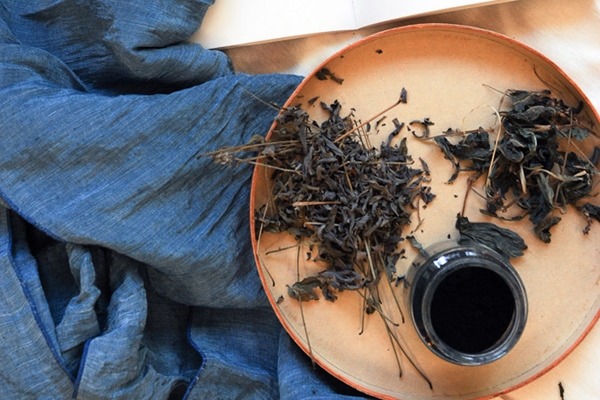15 September 2016. A company making natural dyes for clothing and a plant science research center are discovering genomic processes to improve plants producing indigo, the dye giving blue jeans its color. The 1-year project joining Stony Creek Colors Inc. in Goodlettsville, Tennessee and Donald Danforth Plant Science Center in St. Louis is funded by a $224,700 grant from National Science Foundation.
Stony Creek Colors produces dyes made from plants, as alternatives to most dyes today made with chemicals derived from petroleum. The company is also creating a supply chain for natural dyes, working with growers, textile mills, and clothing brands to meet today’s production specifications and build consumer preference for more sustainable fabrics. This supply chain begins with growers producing crops for natural dyes that need tools to improve yields and profitability.
Among Stony Creek’s offerings is indigo, which in the 18th and 19th centuries was derived from plants, making it major cash crop for of its blue color dye. Nearly all indigo dyes today, however, are made from petroleum-based and other hazardous chemicals. While some traditional and artisanal methods still produce natural indigo dyes, their quality is inconsistent and the small quantities produced make these dyes too expensive for manufacturers.
The project calls for Stony Creek and Donald Danforth Plant Science Center to develop analytical tools to better understand molecular features of Persicaria tinctoria, the plant from which indigo dyes are derived, to produce indican, a precursor chemical to indigo. The work includes a genomic mapping of Persicaria tinctoria, to connect the plant’s genetic characteristics to high- and low-yielding crops.
In addition, the research team will develop a testing device to quickly measure the presence of indican in crop leaves in the fields. Testing processes today require harvesting leaves from the plants and analyzing them in the lab.
“Currently, the measurement of indigo yield is done by harvesting plants or by chemical analysis of precursors,” says Noah Fahlgren, Danforth Center bioinformatics director in a statement, “both of which are time-consuming and difficult to do on large populations, so the ability to use non-destructive techniques to measure or estimate indigo yield will be particularly important to enable rapid screening of breeding materials.” Fahlgren is one of the principal investigators on the project.
“Higher yielding and more consistent indigo crops will allow our bio-based colors to reach deeper into the industrial marketplace,” adds Sarah Bellos, CEO and founder of Stony Creek Colors, “ultimately replacing more of the petroleum based-chemicals currently imported by the textile industry with a domestically grown, plant-derived solution.” Stony Creek plans to commercialize the research results into higher-yielding seeds spread over 26,000 acres of farm land in the southeast United States.
National Science Foundation funded the project from its Small Business Technology Transfer, or STTR, program that sets aside research money for collaborations between small businesses and academic or research institute labs.
Read more:
- Danforth Center, Valent Partner on Underground Plant Imaging
- Animal-Free Leather Company Gains $40M in Venture Funds
- Genetic Techniques Quickly Build Crop Disease Resistance
- Process Devised for Plastics from Carbon Dioxide, Plants
- Gene Editing Enlisted to Fight Citrus Greening
* * *


 RSS - Posts
RSS - Posts
[…] Small Business Grant Funds Natural Dyes Crop Research […]